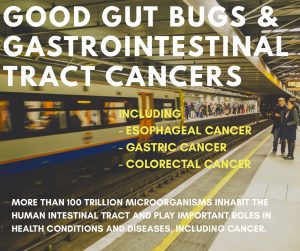Intestinal Bacteria and the Development and Progression of Gastrointestinal Tract Neoplasms
TAKE-HOME MESSAGE
* The authors of this review discuss the role of microorganisms in influencing host immunity and human diseases, including cancer. Microbial dysbiosis (is a microbial imbalance inside the body) may influence gastrointestinal tract tumor development and progression by various mechanisms, such as activating oncogenic signaling pathways and producing tumor-promoting metabolites. However, some bacterial species may suppress inflammation and carcinogenesis due to the production of short-chain fatty acids. Gut microbiota (gut flora) may influence the efficacy of cancer chemotherapy and immunotherapy and may also influence complications after surgery for gastrointestinal tract cancers.
* Advanced understanding of the role of the gut microbiota in the pathogenesis (the manner of development of a disease) of tumor development would allow the development of novel strategies to prevent and treat gastrointestinal tract cancers.
More than 100 trillion microorganisms inhabit the human intestinal tract and play important roles in health conditions and diseases, including cancer. Accumulating evidence demonstrates that specific bacteria and bacterial dysbiosis in the gastrointestinal tract can potentiate the development and progression of gastrointestinal tract neoplasms by damaging DNA, activating oncogenic signaling pathways, producing tumor-promoting metabolites such as secondary bile acids, and suppressing antitumor immunity. Other bacterial species have been shown to produce short-chain fatty acids such as butyrate, which can suppress inflammation and carcinogenesis in the gastrointestinal tract. Consistent with these lines of evidence, clinical studies using metagenomic analyses have shown associations of specific bacteria and bacterial dysbiosis with gastrointestinal tract cancers, including esophageal, gastric, and colorectal cancers. Emerging data demonstrate that intestinal bacteria can modulate the efficacy of cancer chemotherapies and novel targeted immunotherapies such as anti-CTLA4 and anti-CD274 therapies, the process of absorption, and the occurrence of complications after gastrointestinal surgery. A better understanding of the mechanisms by which the gut microbiota influence tumor development and progression in the intestine would provide opportunities to develop new prevention and treatment strategies for patients with gastrointestinal tract cancers by targeting the intestinal microflora.
At Botanica Medica our Naturopaths are well aware of the importance of a good diet and the effect it can have on your life both physically and mentally. They come across lots of interesting studies like this one and are always updating their knowledge. If you would like to make an appointment with one of our Naturopaths call Botanica Medica on 8271-1827 today. They are only to happy to share the knowledge they have gained through their studies and patient outcomes, and get you feeling better. Botanica Medica is located at 97 Glen Osmond Road, Eastwood and appointments are available Monday to Saturday including some after hours.
Published in Oncology
Journal Scan / Review · August 11, 2017
Jeffrey Wiisanen, MD
Surgical Oncology, Volume 26, Issue 4, Pages 368-376
Kosuke Mima, Shuji Ogino, Shigeki Nakagawa, Hiroshi Sawayama, Koichi Kinoshita, Ryuichi Krashima, Takatsugu Ishimoto, Katsunori Imai, Masaaki Iwatsuki, Daisuke Hashimoto


Recent Comments